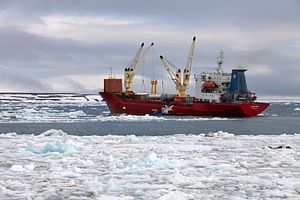“A state has no eternal friends or allies, only eternal interests.” Usually attributed to the British Prime Minister Lord Palmerston, this could be a useful starting point in thinking about Sino-Russian relations in the Arctic. According to a series of recent articles by Barentsobserver, China and Russia are stepping up their cooperation on natural resource extraction in the Russian Arctic (see here and here). While this isn’t earthshaking news, the interesting thing seems that this development appears to have been spurred by western sanctions against Russia, which were put in place due to its intervention in Ukraine and annexation of Crimea.
The Arctic is important to future Russian energy plans. In 2009, Vladimir Putin’s government released a white paper laying out an ambitious program for Arctic resource exploitation. Drilling for oil and gas in the Arctic requires sophisticated technology and equipment, most of which is not developed indigenously by Russian companies. Instead, much of this was acquired through western companies such as Shell, Exxon, and Statoil. However, much of this promptly became unavailable when western sanctions targeted large Russian State-Owned Enterprises (SOEs) following Moscow’s intervention in Ukraine.
This has definitely thrown a spanner into Russia’s ambitions in the Arctic. According to the Barentsobserver, 68 percent of all equipment needed by Russian companies for offshore Arctic drilling is subject to sanctions. In fact, when it comes to offshore shelf exploration, only one percent of the total amount of equipment needed by Russian companies is produced in Russia itself. Russian newspapers have stated that this shortage could in the long run hamper not only planned exploration and drilling projects in places such as Sakhalin and the Pechora Sea, but potentially risk current operations as well.
Enter China. As previously reported by The Diplomat, Russia’s isolation from the West could be a strategic opportunity for Beijing. As several European states are trying to wean themselves of dependence on Russian oil and particularly gas (see here and here), Russia is looking to export their hydrocarbons elsewhere. China is an obvious customer. According to British Petroleum’s yearbook, China is currently getting around 70- to- 80 percent of its oil and gas imports from the Middle East and Africa. Due to economic and strategic reasons, this is something Beijing wants to change by diversifying its sources. Russia is an obvious seller.
This cooperation has already begun. The most prominent example, the 2014 gas agreement, is supposed to connect Russia’s Arctic and Siberian gas fields with China through a 4,000 km-long pipeline named “Siberian Power.” According to Gazprom and the China National Petroleum Corporation (CNPC), the two SOEs primarily responsible for the deal, this pipeline will supply 38 billion cubic meters gas for a whopping $400 billion over the next 30 years. Part of this payment will go towards financing the pipeline itself.
Both CNPC and the China National Offshore Oil Corporation (CNOOC) have already invested in Russian oil and gas fields in the Arctic. Now it looks like they are also getting involved in the maintenance of Russian facilities as well. In an interview with the Russian newspaper Vedomosti, Russian Minister of Natural Resources Sergey Donskoy claims that ”China can on a massive scale and sufficiently quickly produce the equipment needed.” However, Donskoy stresses that the Chinese companies will have to produce the technology in Russia. “Russia will develop cooperation with Chinese companies, but the equipment must be produced here, in Russia, with domestic capacities.”
Donskoy argues that the sanctions imposed by western countries also have a positive effect on the Russian industry. ”This gives us an opportunity to implement the shelf projects the way they originally were planned; as a strategic project which has synergetic effects in the territorial development of the Arctic”. (Interestingly, Donskoy admits that much of the Chinese energy kit is copied from other companies’ technology and equipment. Some of this could be the result of Chinese-origin cyber-attacks aimed at large western energy companies, such as Shell, Exxon and Norway’s Statoil.)
Despite the positive spin by Russian and Chinese officials, issues remain. Some Russians are already grumbling about China and Russia’s increasingly unequal roles in their partnership, especially considering China’s inferiority vis-à-vis the Soviet Union during the Cold War. Furthermore, there is a deep-rooted fear in some sections of the Russian population of “Chinese invasion” of migrants into Russia’s sparsely population Far Eastern provinces.
Beijing and Moscow could do well to remember Palmerston. Even if Beijing and Moscow claim to be allies and mutually beneficial partners in the Arctic, real friendship takes trust to work.
































